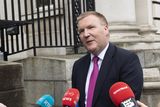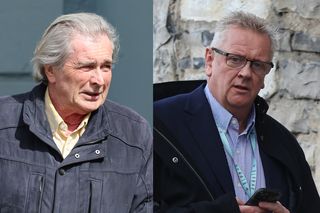ECB won’t lift rates just because inflation hits 2pc, if its a one-off, says Lane
Philip Lane, chief economist of the European Central Bank (ECB) (Photographer: Jason Alden/Bloomberg)
European Central Bank chief economist Philip Lane has given the clearest indication yet that Frankfurt is prepared to live with higher inflation without hiking interest rates.
In a blog post on the ECB’s website the former Central Bank of Ireland governor set out thinking behind recent changes to the ECB’s inflation target, which has been raised to 2pc from a notional target of ‘close to but below 2pc.
The target has come into focus as inflation globally and in the euro area has begun to approach that level; which has prompted some analysts to anticipate some easing back of stimulus and ultimately even an interest rate rise.
Prof Lane said the ECB will only tighten monetary policy by reducing stimulus or raising interest rates – which can each make borrowing more expensive – only if there is strong evidence inflation will hit and stay at 2pc.
"Reaching the inflation target should be lasting and not just be the result of short-lived forces that lead to one-time increases in prices that are unlikely to lead to persistently higher year-over-year inflation,” he said.
“Under the conditions we currently face, forward guidance reinforces the Governing Council’s commitment to attaining the inflation target by clarifying that our policy rates will be lifted only if the evidence is sufficiently robust to allow us to see with a high degree of confidence that the inflation rate will reach two per cent on a durable basis."
That seems to run contrary, at least in tone, to comments by German Bundesbank President Jens Weidmann just over a week ago, who said the ECB would not shield governments from higher borrowing costs if rose.
"The ECB is not there to take care of the solvency security of the states," the German central bank chief told Welt Am Sonntag .
However, Philip Lane’s blog post set out what is in effect an reassurance that higher inflation will not feed into a near term change in ECB policy, under the new target, including conditions inserted into the bank’s language on the issue.
“The first condition ‘until we see inflation reaching two per cent well ahead of the end of our projection horizon’ provides reassurance that the convergence of inflation towards the new target should be sufficiently advanced and mature at the time of policy rate lift off. Moreover, requiring the inflation target to be reached “well ahead of the end of the projection horizon” helps to hedge monetary policy against the risk of reacting to forecast errors, which tend to be larger at longer horizons,” he wrote.
Join the Irish Independent WhatsApp channel
Stay up to date with all the latest news














